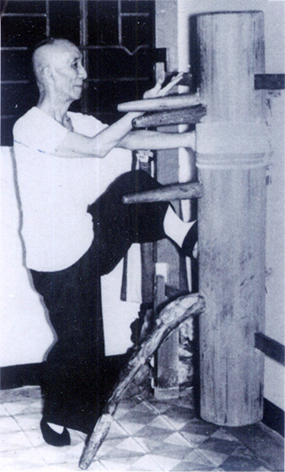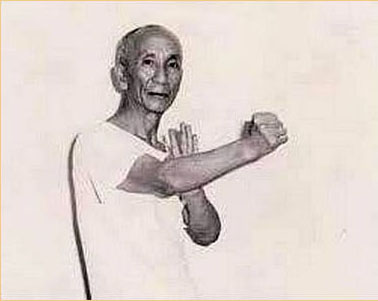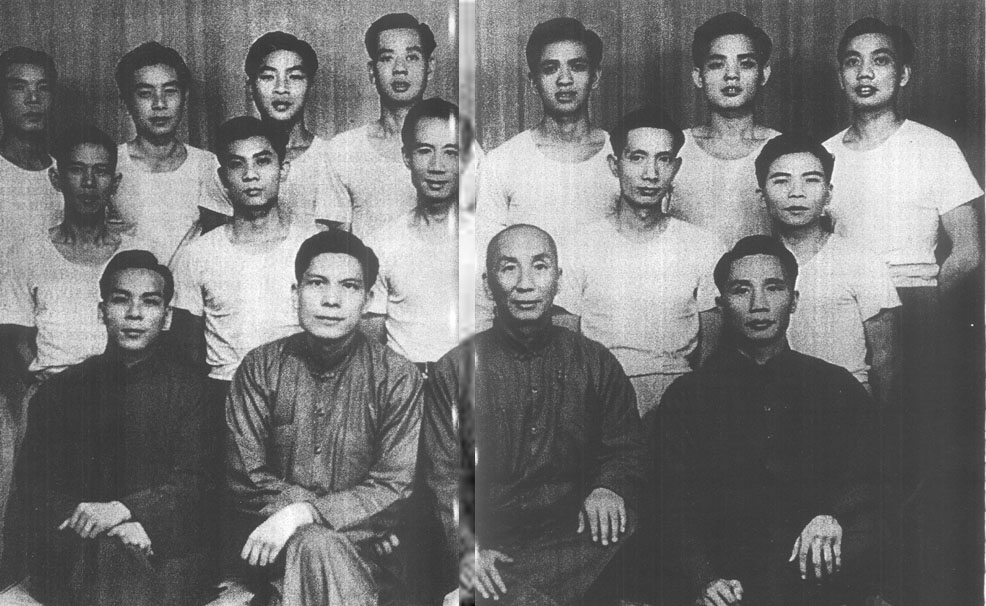Yip Man

Yip Man (Ye Wen) is probably the most well-known Chinese martial artist. He was born in Fatsaan, 14 October, 1893. He was raised in a wealthy family; they had houses and shops in the city. Chan Wa Seun (Chen Huashun) master rented the back garden of one of their houses for teaching. This way Yip Man had the chance to observe the style. Yip Man wanted to learn martial arts so he used this opportunity. He asked his mother to be an intermediary who managed to convince master Chan to take his son. Six years later Chan Wa Seun died, therefore he continued practicing with the master’s leading apprentices Hng Juhng Sou (Wu Zhongsu) and some of his other fellow students such as Ng Siu Lou (Wu Xiaolu), Leui Yu Jai (Lei Ruji) and Chan Yu Min (Chen Rumian).
Out of Chan Wa Seun’s apprentices, Yip Man was the youngest; therefore he did not want to start teaching in order to avoid offending his Kung-fu brothers. Moreover, he did not talk about his martial art studies, not even to his family.
One time, for the occasion of a spring holiday, lion and dragon dances were performed next to the Temple of the Monkey-king. On behalf of his auntie’s request Yip Man escorted two of his nieces so they can watch the performance. Out of the crowd on the scene, a group of 6-7 young men noticed the two pretty girls and started to harass them. Yip Man had enough really quickly and demanded an apology from the men. However; they did not take the well-dressed, slim man seriously: they thought he was only a spoiled and rich kid. One of the guys stepped to the front so he can push Yip Man away, however, after several attempts; he still only managed to hit nothing else but the air. As a result, he gathered all his power and tried to hit him again, but shortly after he ended up on the ground. Moments later the members of the gang realized what had happened and they attacked Yip Man. Yip Man did not move much. When one of them intended to strike him, he turned a little to avoid being hit and almost immediately counterattacked the midline of his enemy in order to move him out of balance. Every single time when they were about to hit him, Yip Man suddenly moved away or fended off the strikes. Sometimes it seemed like he hardly touched his enemy but as a result of the touch the assaulter collapsed from the pain. However none of them were injured seriously. The combat ended within a short time and the gang ran off from the scene. This incident made Yip Man’s name famous in Fatsaan.

Yim replied: „Mister Yip, I have a rule that in case you can hit me on the stomach so hard that I cannot stand, I will go with you for free. But if you fail, you have to pay 10 ounces of gold. I can see you come from a good family and I do not know whether you have any idea about martial arts. I am afraid that you might just hurt your hands!” Yip Man smiled and said: „I have never in my life hit a woman before. If you do not mind I would like to give it a try. Here is the gold, if I lose, it is yours.”
Yim Hung performed a short breathing exercise and tensed her stomach that indeed looked extremely firm. Yip Man put his fingers to the woman’s stomach gently and stroke it shortly but fast. Yim Hung was battling for breath and collapsed on the floor. Yip Man quickly helped her up and apologized: „The money is yours and I do not expect anything in return.” He wrote down the name of a medicine that would help her to restore her Qi circulation. After that he and his friends said goodbye and left.
Another time Yip Man was having his evening stroll to admire the full moon. There were quite a few people on the streets and Yip Man accidently stepped on a person’s feet. When he stopped to apologize he realized that the man was a soldier. During those times in China (ever since the fall if the Qing dynasty) different short-life governments were replacing one another, while separate military units and provinces ruled by military commanders acted as distinct forces. The government could not really call to account any soldiers regarding their matters; consequently they acted as they pleased without any consequences. Similarly, this very soldier sprang to arms to shoot the badgering civilian. Before he could have fired his gun, Yip Man acted. He grabbed the weapon and twisted it so that the bullets fell on the ground. The officer was shocked and before he could have done anything Yip Man already disappeared in the crowd.
First apprentices
One day a local tradesman Jau Chen Chung invited Yip Man to his home and asked him to teach his son. Since Yip Man had financial problems, after thinking a little while, he accepted. The news surprised everybody because so far Yip Man had always declined any similar requests. One of his friends new a Choi Lei Fat master, Wan Dai Han, who he introduced to Yip Man. Wan invited Yip Man for a friendly combat challenge who taught this actually could be a great chance to make Wing Chun more popular so he accepted the challenge. They agreed on the details and even a doctor was asked to participate in judging. The combat took place. Wan started with a series of attacks. Yip Man avoided the strikes by making small steps and turns, after which he broke his opponent’s rhythm and he stepped towards his midline to attack his body and head. Wan could not elude and after one of the strikes he fell. The judge interfered and stopped the fight. In order not to hurt anyone’s feelings he announced a draw. However from this time on no one ever mentioned that Yip Man was teaching Wing Chun. During these times he was teaching Jau Gwong Yu (Zhou Guangyu), Gwok Fu (Guo Fu) and Leun Gaai (Lun Jia).
Meanwhile the Japanese attacks against China became more and more intensive so Yip Man decided to move to Hong Kong with his family. There for financial reasons he accepted the invitation of Hu Yi, the president of the Association of Restaurant Workers and started to teach its members. This is where many of his famous apprentices started their studies: Leung Seung (Liang Xiang), Lok Yiu (Luo Yao), Cheui Seung Tin (Xu Shangtian), Lou Man Gam (Lo Man Kam, Lu Wenjin), Wong Seun Leung (Huang Chunliang). And later Mui Yat (Mei Yi), Jeung Cheuk Hing (Zhang Zhuoqing, William Cheung), Ho Gam Ming (He Jinge) as well as Lei Siu Lung (Li Xiaolong, Bruce Lee).
In order to make his style well-know in Hongkong, especially in the beginning, he sent his apprentices to various competitions and contest for which he trained them very well. Also, to make the school’s development even faster, he taught some of his pupils to specific fields so eventually they became experts. So Cheui Seung Tin became an expert of Siu Nim Tau (and its related exercises), Leung Seung of Biu Ji (and its related exercises), Lok Yiu became that of the Long-pole (and its related exercises). Later of course they learnt the whole style, but this gave special characteristics to their own styles (with a different base).
In the fifties Yip Man’s two adult sons also managed to reach Hongkong. By this time, the school led by Yip Man was very famous, so he thought he could make a living out of teaching Wing Chun. He asked two of his apprentices Lok Yiu and Wong Seun Leung to start teaching his sons. (In China it was a common practise that Kung-fu masters asked someone within the clan to teach their child and themselves would only be engaged in the teaching process once they reach a higher level. This basically happened due to the two different natures of child-raising. As a parent they were usually good-natured, while as a teacher they were very tough. As one of the masters said: „That will not work if in the morning I stroke his head and tell him I love him while in the evening I hit him with a bamboo-stick.”) The difference between the bases can be seen even until today. Yip Jing’s style resembles that of Wong Seun Leung, while Yip Jeun’s is more like Lok Yiu’s.
The school of Yip Man grew bigger than the place which had been previously provided by the Association, so soon they opened their own.
He was the first grandmaster who taught Wing Chun publicly. Thanks to his work the Wing Chun became one of the most popular styles and due to his apprentices it even reached West.
Early group photo, front row from left to right Lok Yiu, Leung Seung, Yip Man and Yip Jing



